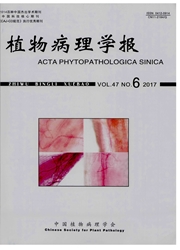

 中文摘要:
中文摘要:
以辣椒“All”和黄瓜炭疽病菌( Colletotrichum orbiculare)组成的非寄主互作体系为研究对象,利用组织化学方法研究了辣椒叶片微管骨架解聚后接种黄瓜炭疽病菌,对抗病反应相关的乳突、H202和过敏性坏死反应的影响以及黄瓜炭疽病菌在非寄主辣椒上的侵入状况,揭示微管骨架在辣椒-黄瓜炭疽病菌非寄主互作中的作用。结果表明,微管骨架解聚显著抑制了乳突的形成,H2O2的积累也明显减弱,使黄瓜炭疽病菌能成功侵入辣椒细胞,表明微管骨架参与了辣椒的非寄主抗病性反应,微管的聚合在辣椒非寄主抗病性中具有重要的作用。
 英文摘要:
英文摘要:
In order to reveal the participation of microtubules in the interaction of nonhost pepper cultivar "All" and Colletotrichum orbiculare, the defense reactions (papilla formation, oxidative burst and hypersensi- tive response) and the penetration process were investigated histochemically after microtubule depolymerization of the pepper leaves. The results indicated that the depolymerization of microtubules significantly weakened the production of the papilla formation and H202 burst on pepper leaves, and allowed successful penetration of the non-adapted C. orbiculare. It was concluded that microtubules participated in the nonhost resistance and the polymerization of microtubules was significant in nonhost resistance of pepper.
 同期刊论文项目
同期刊论文项目
 同项目期刊论文
同项目期刊论文
 Effects of Microtubule Polymerization Inhibitor on the Hypersensitive Response of Wheat Induced by t
Effects of Microtubule Polymerization Inhibitor on the Hypersensitive Response of Wheat Induced by t Ultrastructural Study on Induced Resistance of Cucumber Plants against Sphaerotheca fuliginea by Oli
Ultrastructural Study on Induced Resistance of Cucumber Plants against Sphaerotheca fuliginea by Oli 期刊信息
期刊信息
